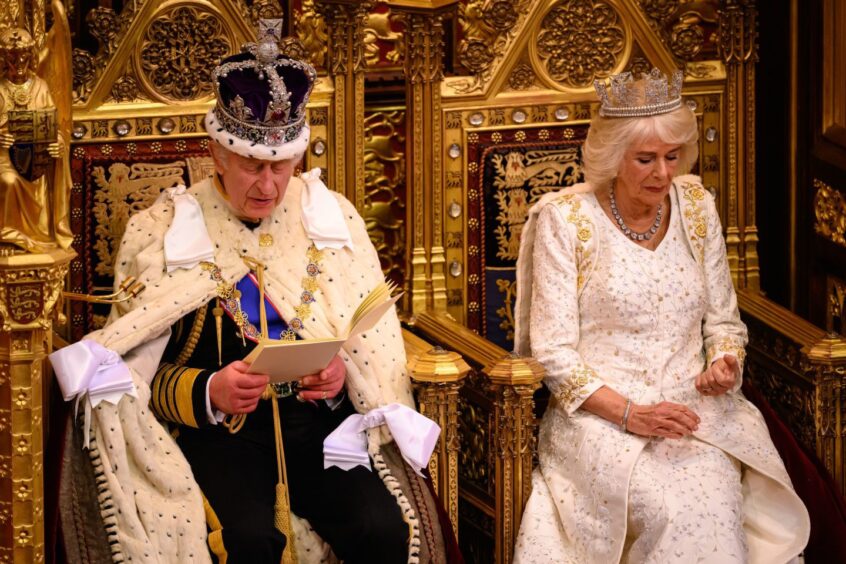
The first King’s Speech in over 70 years has outlined plans to “attract record levels of investment in renewable energy” – but experts say fresh measures are needed to achieve that.
King Charles III said in the House of Lords: “My ministers will seek to attract record levels of investment in renewable energy sources and reform grid connections, building on the United Kingdom’s track record of decarbonising faster than other G7 economies.”
His Majesty has shown a keen interest in renewable energies in the past and has introduced carbon-cutting measures to Windsor and a Geothermal feasibility survey is being carried out at Balmoral.
RenewableUK’s chief executive Dan McGrail “welcome the Government’s commitment in the King’s Speech,” however, he explained that to achieve this goal the Chancellor must set out specific policies in his Autumn Statement.
Mr Mcgrail said: “We’re calling for a commitment by the Chancellor to work with the Department for Energy Security and Net Zero to set an overall budget, and maximum strike prices, at appropriate and sustainable levels which allow for a return on investment for vital new projects.
“We also need to see a change in the rules on capital allowances, so that offshore wind projects qualify for the main rate of 18%, rather than the lower rate of 6% which developers get at present.”
The RenewableUK boss also outlined ambitions to have the Electricity Generator Levy, which has been heavily criticised by industry.
Earlier this year, it was reported that Community Windpower’s 44-turbine Sanquhar II wind farm “ground to a halt” due to the rising fees put in place by the incoming renewables windfall tax.
Dan McGrail added; “We’re also calling for measures to attract further investment in the UK’s offshore wind supply chain and port infrastructure.
“There’s a global shortage of offshore wind products and services, so we have a great opportunity not only to build up our domestic market but also to export worldwide.”
Annual North Sea licences
This week it was reported that the UK Government plans to put in place new legislation for North Sea oil and gas licences to be awarded annually.
The bill was introduced in King Charles’ speech earlier today.
His Majesty said: “Legislation will be introduced to strengthen the United Kingdon’s energy security and reduce reliance on volatile international energy markets and hostile foreign regimes.
“This bill will support the future licencing of new oil and gas fields, helping the country to transition to net zero by 2050, without adding undue burdens on households.”
Currently, there are no fixed terms for North Sea rounds, and the licences awarded in the 33rd round last month were the first in three years.
The government says that introducing annual awards will protect jobs, tax receipts and reduce reliance on imports which have a higher carbon footprint.
However, there has been criticism of this proposed legislation as some view the move as “political posturing” rather than an effective move to ensure investment in the country’s hydrocarbon industry.
Tessa Khan, executive director of Uplift: “In the 24 hours since it announced these plans, the case for new licensing has crumbled.”
Ms Khan added: “Rishi Sunak is playing politics with energy policy, while millions of people face another winter of unaffordable energy bills.”
The International Energy Agency also said in September that no new long-lead-time oil and gas projects are required if the world is to hit net zero.
For annual licences to see success reform would have to come to the energy profits levy, or windfall tax, as currently the controversial fiscal regime has been criticised for scaring away investment.
With the country facing an upcoming general election, there is also an opinion being shared that if the Labour Party is to win, the new government would overturn the legislation, therefore creating greater uncertainty in the sector.
Earlier this year, Keir Starmer’s Labour would stop all new oil and gas licences in the North Sea if it were to win the next election, however, that stance has since been softened.
Offshore Energies UK chief executive, David Whitehouse, commented on the news of the proposed legislation earlier this week, saying: “The UK needs the churn of new licences to manage production decline in line with our maturing basin.
“A predictable licencing process with transparent checks will support the highly skilled people working in the sector, while ensuring the granting of new licences is compatible with energy security and net zero.”
Recommended for you

 © Supplied by Renewable UK
© Supplied by Renewable UK © Supplied by Uplift
© Supplied by Uplift © Supplied by Michal Wachucik/Aber
© Supplied by Michal Wachucik/Aber